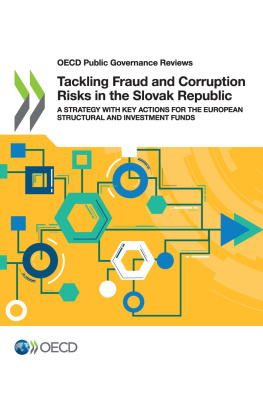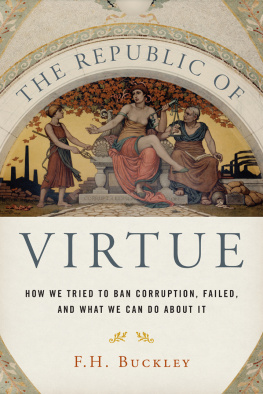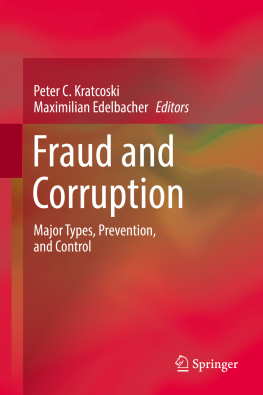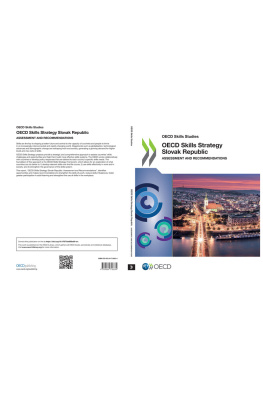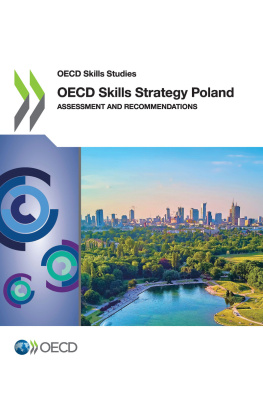OECD - Tackling Fraud and Corruption Risks in the Slovak Republic
Here you can read online OECD - Tackling Fraud and Corruption Risks in the Slovak Republic full text of the book (entire story) in english for free. Download pdf and epub, get meaning, cover and reviews about this ebook. year: 2019, publisher: OECD Publishing, genre: Business. Description of the work, (preface) as well as reviews are available. Best literature library LitArk.com created for fans of good reading and offers a wide selection of genres:
Romance novel
Science fiction
Adventure
Detective
Science
History
Home and family
Prose
Art
Politics
Computer
Non-fiction
Religion
Business
Children
Humor
Choose a favorite category and find really read worthwhile books. Enjoy immersion in the world of imagination, feel the emotions of the characters or learn something new for yourself, make an fascinating discovery.
Tackling Fraud and Corruption Risks in the Slovak Republic: summary, description and annotation
We offer to read an annotation, description, summary or preface (depends on what the author of the book "Tackling Fraud and Corruption Risks in the Slovak Republic" wrote himself). If you haven't found the necessary information about the book — write in the comments, we will try to find it.
OECD: author's other books
Who wrote Tackling Fraud and Corruption Risks in the Slovak Republic? Find out the surname, the name of the author of the book and a list of all author's works by series.
Tackling Fraud and Corruption Risks in the Slovak Republic — read online for free the complete book (whole text) full work
Below is the text of the book, divided by pages. System saving the place of the last page read, allows you to conveniently read the book "Tackling Fraud and Corruption Risks in the Slovak Republic" online for free, without having to search again every time where you left off. Put a bookmark, and you can go to the page where you finished reading at any time.
Font size:
Interval:
Bookmark:
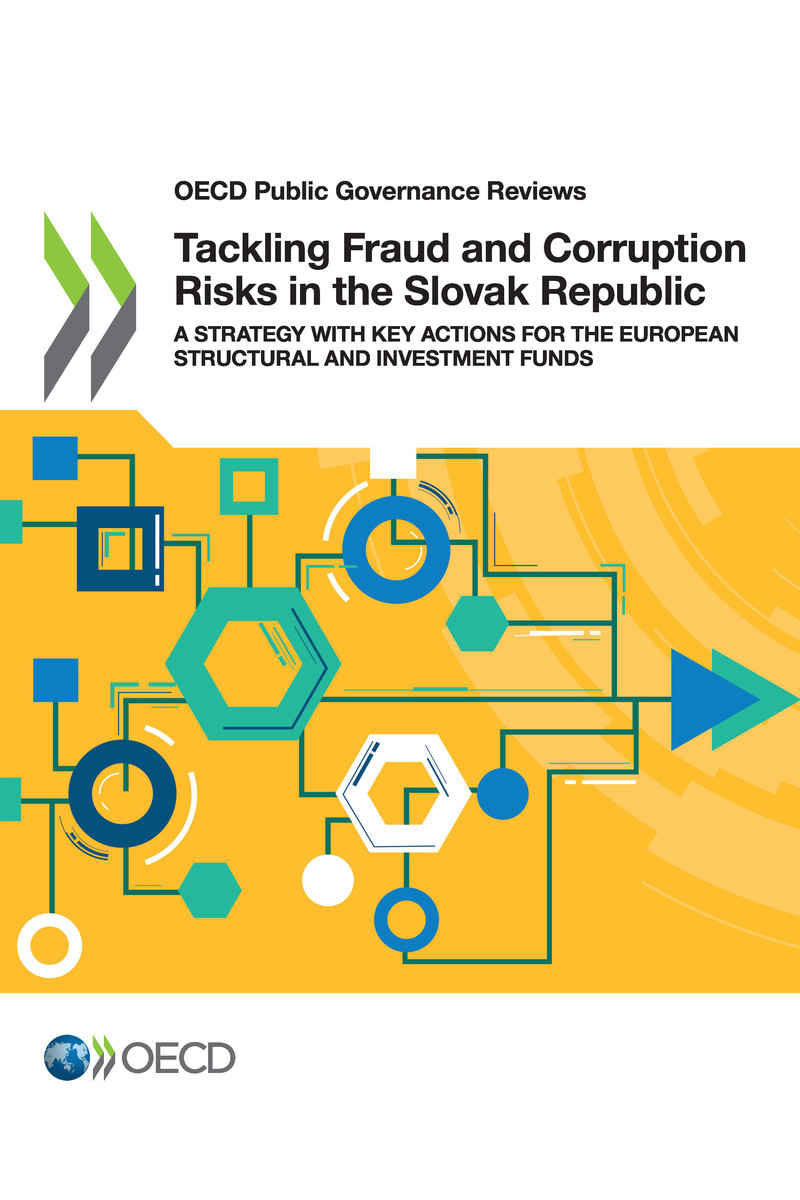
OECD (2019), Tackling Fraud and Corruption Risks in the Slovak Republic: A Strategy with Key Actions for the European Structural and Investment Funds , OECD Public Governance Reviews, OECD Publishing, Paris, https://doi.org/10.1787/6b8da11a-en .
Through the European Structural and Investment (ESI) Funds, the European Union invests billions of euros in job creation and a sustainable and healthy European economy and environment. Programmes to boost employment, education, social equity, competition, and agriculture rely on a EUR 450 billion budget for the programming period of 2014-20. These investments are critical for the development and growth of economies across EU Member States.
Given the size of these financial flows, it is of paramount importance that the right mechanisms are put in place to mitigate the risks of misappropriation of funds. Fraud and corruption divert taxpayers money away from investments intended to boost job creation and socio-economic development. Ultimately, this can poison public trust.
During the current programming period, the government of the Slovak Republic has faced threats to the integrity of the ESI funds. In response, it embraced a holistic approach, recognising the need to improve not only the detection and investigation of fraud and corruption, but also prevention through risk management and internal control.
As part of its work to help countries battle fraud and corruption, the OECD assisted the government of the Slovak Republic in modernising its risk management strategy for ESI Funds. Recognising the existing, robust normative and policy frameworks, the OECD focused on overcoming implementation challenges. The result is a plan of action that offers tailored guidance for both Managing Authorities, who play a critical role at the operational level, and centre of government bodies, who take the overall lead in this area. The strategy proposes concrete actions for refining risk assessments and mitigations, and it includes suggestions for greater precision of the risk assessment process through better use of data.
Apart from rigorous risk assessment, effectively handling fraud and corruption risks requires a robust risk management culture, so that assessments lead to better decision-making. As new risks emerge, the government will need to focus on further improving capacity and skills. The strategy presented here provides guidance on the necessary steps for doing so, along with insights on how to monitor and evaluate the entire risk management framework. Better co-ordination among managing authorities, central government, the Public Procurement Office, law enforcement and regulatory bodies can help to make further progress.
Preventing fraud and corruption in ESI Funds is a shared responsibility. The strategy outlines key actions to promote a common understanding of those responsibilities, with guidance for fulfilling them. The strategy draws from the OECD Recommendation of the Council on Public Integrity and related international standards, as well as insights from OECD member and partner countries. Its ultimate goal is to foster more effective, integrity-driven policies for better lives and outcomes for Slovak citizens.
This strategy was prepared by the Public Sector Integrity Division of the Directorate for Public Governance under the leadership of Janos Bertk and Julio Bacio Terracino. The strategy was drafted by Gavin Ugale, Lisa Kilduff, and Angelina Zhao. The strategy benefitted from insights provided by Angelos Binis. Editorial and administrative support was provided by Meral Gedik, Rania Haidar, Aleksandra Bogusz, and Thibaut Gigou.
The OECD expresses its gratitude to the government of the Slovak Republic for its commitment and co-operation in developing this strategy, in particular Denisa illkov, General Director of the Central Co-ordination Body, Office of the Deputy Prime Minister for Investments and Informatisation, Mat Drotr, Director of the Department of Methodology and Coordination of Institutions within the Central Co-ordination Body, Office of the Deputy Prime Minister for Investments and Informatisation, and Igor Jaurek, Senior Expert within the Department of Methodology and Coordination of Institutions of the Central Co-ordination Body, Office of the Deputy Prime Minister for Investments and Informatisation. The OECD would also like to thank the Ministry of Education, Science, Research and Sport, the Ministry of Environment, the Ministry of Transport and Construction, the Ministry of Labour, Social Affairs and Family, the Ministry of Finance, the Public Procurement Office, the General Prosecutors Office, the Anti-Monopoly Office, the Procurement Unit of the Deputy Prime Ministers Office, the Anti-Corruption Unit of the Government Office, and central contact point (CCP) OLAF for their participation and invaluable inputs for this strategy.
The OECD wishes to thank the international group of experts that contributed to the strategy and workshops, namely, Pilar Senz de Ormijana Valds, Head of the Support Unit within the Anti-corruption Prosecutors Office, Spain, Declan Wylde, Head of Finance, Transport Infrastructure, Ireland, Simon Hannah, ESIF Compliance and Quality Assurance Manager, United Kingdom, Jo Kremers, Senior Audit Manager, Ministry of Finance, the Netherlands, Andris Kairis, EU Funds Project Manager, Latvian School of Public Administration, Mark Schelfhout, Head of Unit Audit Shared Management I, DG Employment, Social Affairs and Inclusion, European Commission, and Rando Undrus, Anti-Fraud Advisor, Agricultural Registers and Information Board, Estonia.
Font size:
Interval:
Bookmark:
Similar books «Tackling Fraud and Corruption Risks in the Slovak Republic»
Look at similar books to Tackling Fraud and Corruption Risks in the Slovak Republic. We have selected literature similar in name and meaning in the hope of providing readers with more options to find new, interesting, not yet read works.
Discussion, reviews of the book Tackling Fraud and Corruption Risks in the Slovak Republic and just readers' own opinions. Leave your comments, write what you think about the work, its meaning or the main characters. Specify what exactly you liked and what you didn't like, and why you think so.

